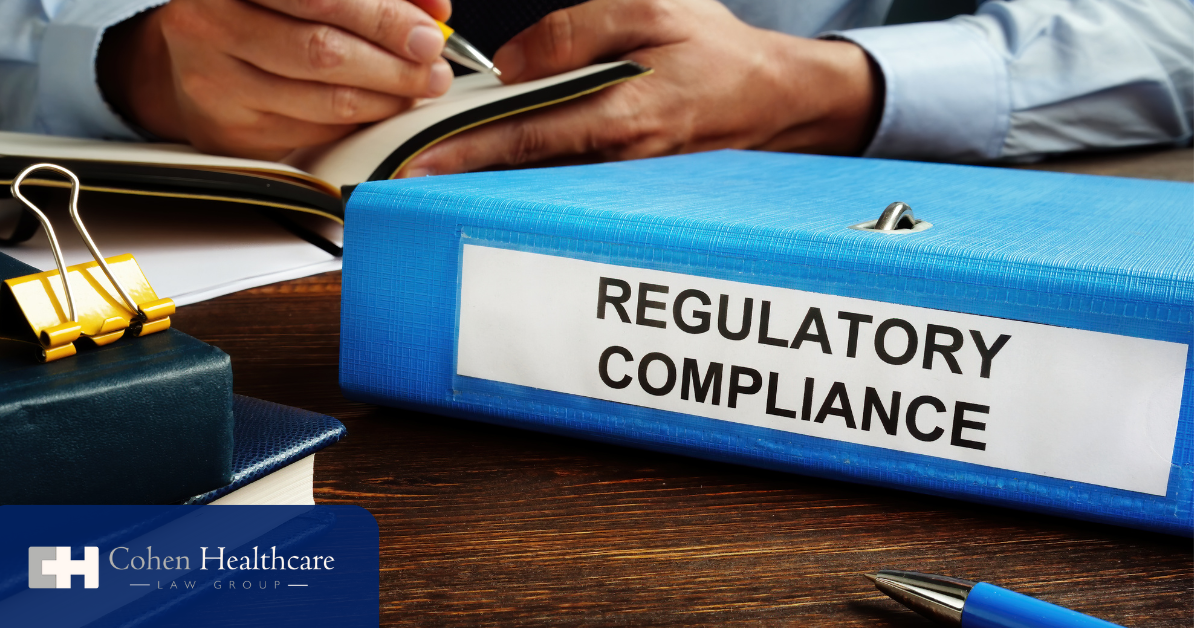
Durable Medical Equipment (DME) refers to medically necessary devices intended for repeated use, often prescribed by physicians and reimbursed by Medicare, Medicaid, or private insurers. Because DME plays a direct role in patient treatment, and often involves federal reimbursement, the industry is tightly regulated.
The DME industry is governed by a complex web of federal and state regulations, and failing to comply isn’t just a bureaucratic misstep. This is because failing to comply can lead to shutting your business down entirely. From FDA oversight to CMS supplier standards, billing compliance, and fraud laws, every stage of your product’s lifecycle is under scrutiny.
Our attorneys at Cohen Healthcare Law Group specialize in helping medical device manufacturers navigate FDA regulations. With over 30 years of experience, we are here to guide you through medical devices regulations, avoiding billing and marketing missteps, and building legally sound operations. Contact us now!
This blog will break down what counts as Durable Medical Equipment (DME) and why legal and regulatory compliance is critical for every DME company. We will also share the key compliance areas you need to know.
Table Of Contents
- What Is Durable Medical Equipment (DME)?
- What Happens If You Don’t Comply With DME Regulations?
- Regulatory Framework for Durable Medical Equipment Compliance
- How to Stay Compliant With Durable Medical Equipment Regulations
- The Future of Durable Medical Equipment Compliance
- Is Your DME Business Fully Compliant and Protected?
- FAQ
- What Does Durable Medical Equipment Compliance Mean for Suppliers?
- How Often Should DME Compliance Audits Be Performed?
- What Are the Most Common DME Billing Errors?
- What Documentation Is Required for DME Compliance?
- How Often Should DME Providers Update Their Compliance Training?
- Do I Need a Healthcare Lawyer for DME Compliance?
What Is Durable Medical Equipment (DME)?
Durable Medical Equipment (DME) refers to medical devices designed for long-term use, prescribed by a licensed healthcare provider to aid in a patient’s daily activities or treatment plan. DME must meet some specific criteria, such as being durable, used for a medical purpose, not typically useful to someone who isn’t sick or injured, and appropriate for home use.
Common examples of DME include wheelchairs and mobility scooters, hospital beds and home care beds, oxygen tanks and concentrators, CPAP machines for sleep apnea, nebulizers, suction pumps, and infusion devices. Walkers, canes, crutches, commode chairs, and patient lifts are also examples of DME.
While prosthetics, orthotics, and medical supplies are also critical in healthcare, they are distinct from DME. Generally, prosthetics replace missing body parts, orthotics like braces or shoe inserts provide structural support, while supplies include disposable items like wound dressings or diabetic test strips. In contrast, DME is categorized separately due to its durability and long-term use in patient care.
DME is often used by patients with chronic illnesses, mobility impairments, or those recovering from surgery. This includes seniors, individuals with disabilities, and people managing respiratory or neurological conditions at home.
Because DME directly affects patient safety, quality of care, and medical outcomes, compliance is not just a regulatory box to check, but a moral and legal obligation. Equipment that is defective, improperly labeled, or sold without proper clearance can put patients at serious risk and expose manufacturers and sellers to devastating legal consequences.
Who Can Create and Sell Medical Equipment
Manufacturing and distributing medical equipment in the U.S. is heavily regulated by the FDA and other federal and state agencies. To ensure patient safety and maintain public trust, only qualified entities are permitted to make and sell DME.
They include:
- Licensed Manufacturers: Only companies or individuals with appropriate licensing from regulatory agencies, such as the FDA, are authorized to manufacture medical equipment. These manufacturers must comply with rigorous safety, labeling, and production standards.
- Regulatory Approval: Before a medical device can be sold or distributed, it must go through the FDA medical device classification system (Class I, II, or III) and may require premarket notification (510(k)) or premarket approval (PMA) depending on the risk level.
- Quality Standards Compliance: DME manufacturers must comply with the FDA’s Quality System Regulation (QSR), which outlines processes for design control, production, process validation, complaint handling, and more. Many companies also adopt international standards like ISO 13485 to reinforce quality assurance.
- Distributors and Suppliers: Distributors must have valid business licenses and ensure that all medical devices they sell are FDA-compliant and properly labeled. They are responsible for tracking, reporting adverse events, and ensuring storage conditions meet safety requirements.
- Healthcare Providers and Pharmacies: In certain cases, licensed healthcare providers and pharmacies may sell or dispense DME directly to patients. However, they must still comply with state and federal laws, including billing regulations if products are reimbursed by Medicare or Medicaid.
- Registration Requirements: All manufacturers, repackagers, relabelers, and sellers must register their establishments with the FDA and list the devices they market. This ensures traceability and accountability throughout the device lifecycle.
- Importers and Exporters: Medical device companies that import or export DME must navigate both U.S. regulations and international compliance standards. This includes documentation, labeling, and proper declarations at customs.
- Compliance with State Laws: In addition to federal laws, each U.S. state may have its own licensing requirements and DME supplier regulations. Some states require Board of Pharmacy permits or separate registration processes for DME businesses.
- Prohibited Sellers: It is illegal for unauthorized individuals or unlicensed companies to manufacture or sell medical equipment. Doing so can result in FDA enforcement actions, civil penalties, criminal charges, and business closure.
What Happens If You Don’t Comply With DME Regulations?
Operating a durable medical equipment (DME) business without full compliance is both risky and catastrophic. From financial penalties to loss of your ability to bill Medicare and Medicaid, the consequences of non-compliance with federal regulations can destroy a business and damage your reputation beyond repair.
As a durable medical equipment provider, your compliance obligations span multiple layers, including FDA rules, CMS reimbursement guidelines, and state licensing requirements. Failing to meet these standards can quickly trigger investigations by the Office of Inspector General, audits by federal healthcare programs, and even civil and criminal penalties.
If your DME company submits reimbursement claims for products that lack medical necessity, or if you operate without a proper DME license, you risk being removed from federal healthcare benefit programs altogether. Losing the ability to bill Medicaid services or Medicare beneficiaries can immediately stop revenue flow, placing your entire operation in jeopardy. Worse still, improper billing, lead generation arrangements, or marketing practices that violate the Anti-Kickback Statute or Stark Law can result in lawsuits, criminal penalties, and publicized disciplinary actions that permanently stain your brand.
The risks go beyond just financial loss. Distributing faulty or non-compliant medical equipment, such as hospital beds, portable oxygen equipment, or other devices intended for long-term patient use, can lead to patient harm. When a durable medical device fails or is improperly authorized, the patient pays the price.
Why Compliance Matters in Durable Medical Equipment
Your DME business must adhere to a maze of compliance requirements, including FDA rules for medical devices, CMS billing policies, and state law mandates on licensure and disclosures. Navigating these rules often requires conducting internal monitoring, implementing written policies, and ensuring HIPAA compliance to safeguard protected health information. For companies engaging in marketing, especially with a lead generation company, obtaining disclosure and written authorization is essential to avoid improper payments and associated penalties.
The financial implications of noncompliance are massive. Denied claims, regulatory fines, costly penalties, and interrupted revenue cycles can leave even well-established DME companies scrambling. Developing corrective action, responding promptly to government inquiries, and working with a knowledgeable compliance officer or compliance team are essential steps to reduce risk. In many cases, forming a compliance committee and conducting effective training for staff can provide early warning signs before problems escalate. However, these are intricate steps, best handled under the guidance of experienced legal counsel.
That’s where Cohen Healthcare Law comes in. With years of experience helping DME suppliers, medical practices, and DME retailers build legally sound operations, our team helps providers obtain accreditation, manage licensing needs, and stay compliant with both federal law and state regulations. Whether you’re dealing with marketing materials, complex financial relationships, or need help understanding how to bill Medicare on a case-by-case basis, we can help you design effective compliance measures from day one.
Compliance is also a matter of ethics and patient trust. The patients using your oxygen equipment, mobility devices, and other DME rely on providers who operate transparently, legally, and with care. When your organization implements strong compliance systems, you show that patient safety is not an afterthought. That integrity goes a long way in building your reputation among healthcare partners, referral sources, and regulators.
Regulatory Framework for Durable Medical Equipment Compliance
Understanding the regulatory framework for durable medical equipment compliance is critical for every DME business operating in the healthcare industry. Failure to adhere to your compliance obligations can result in civil and criminal penalties, denied reimbursement claims, and significant disruptions to business operations. That’s why successful DME companies must build a strong compliance team, implement written policies, and stay vigilant through conducting internal monitoring and continuous education.
Which Regulatory Bodies Oversee Durable Medical Equipment?
Multiple government agencies and recognized organizations oversee the regulatory compliance of medical equipment in the United States. There is The Centers for Medicare & Medicaid Services (CMS) that plays a central role in defining how DME is billed, what documentation supports medical necessity, and what standards DME suppliers must meet to maintain billing privileges under federal healthcare benefit programs. Losing access to CMS programs can be devastating for DME retailers, especially those relying heavily on Medicare beneficiaries for revenue.
Then there is the Food and Drug Administration (FDA) that governs the safety, labeling, and classification of medical devices, including durable medical products. Depending on the type of equipment, manufacturers must meet the FDA’s quality system standards and may require premarket notification or approval. Operating without proper FDA clearance or failing to meet quality standards can subject your organization to criminal penalties and product recalls.
Similarly, the Office of Inspector General (OIG) monitors for fraud, waste, and abuse across federal healthcare programs. DME providers that engage in improper billing, improper payments, or questionable lead generation arrangements may be investigated and penalized under well publicized disciplinary guidelines. OIG also issues advisory opinions and provides compliance education to reduce risk.
Furthermore, accrediting organizations like The Joint Commission and other agencies approved by CMS offer formal accreditation for DME suppliers. Achieving this accreditation not only fulfills certain regulatory requirements but also enhances your business’s credibility. To obtain accreditation, a DME company must demonstrate effective compliance measures, such as a functioning compliance committee, effective training programs, and clear protocols for addressing compliance challenges.
What Are the Key Laws and Regulations for Durable Medical Equipment Compliance?
Several laws and regulatory codes directly impact how DME suppliers operate. The Medicare Conditions of Participation (CoPs) set forth the basic rules that must be met for participation in Medicaid services and Medicare. These conditions affect everything from clinical documentation and prior authorization to how DME is dispensed and billed. Adherence to CoPs is critical for maintaining eligibility under federal healthcare benefit programs.
Likewise, the 21 CFR (Code of Federal Regulations), particularly Title 21, outlines the FDA’s standards for medical devices and the required manufacturing, labeling, and post-market surveillance processes. Failing to meet these federal regulations can lead to product seizures, warning letters, and even the shutdown of operations.
Another essential law is the Health Insurance Portability and Accountability Act (HIPAA). DME companies must maintain HIPAA compliance when handling protected health information (PHI).
Furthermore, the federal anti-kickback statutes and the Stark Law impose strict rules on financial relationships between medical practices, DME businesses, and referral sources.
How to Stay Compliant With Durable Medical Equipment Regulations
Staying compliant with durable medical equipment regulations is not just about avoiding penalties, but also about protecting your patients, your business, and your standing within the healthcare system.
Below are helpful tips:
Understand and Follow Regulations
Effective DME compliance begins with understanding the complex network of federal regulations and state laws that affect your medical equipment operations. Every durable medical equipment DME company must be proactive in keeping up with changing compliance requirements. Key agencies like the FDA, CMS, and state departments of health set the rules that govern DME suppliers.
These federal and state entities define how to handle medical necessity, prior authorization, and equipment classifications under various federal healthcare programs. Ignorance is not an excuse when you’re facing civil and criminal penalties.
Maintain Licensing and Accurate Documentation
All DME businesses must hold the proper licenses, including a valid DME license, and in some cases, a pharmacy license. In addition to obtaining licensing, companies are responsible for maintaining detailed records related to equipment orders, patient usage, and delivery confirmations.
These documents serve as your defense against allegations of non-compliance, improper payments, or reimbursement claim fraud. Keeping these records organized and regularly reviewed should be a key responsibility for your compliance officer or compliance team.
Implement Effective Billing and Coding Practices
Accurate billing is essential to maintaining your status as a trusted provider under federal healthcare benefit programs. Using the correct HCPCS codes for every product reduces the risk of claim denials, audits, or accusations of fraud.
DME companies must monitor each submission for compliance with CMS billing guidelines, especially when billing Medicare or Medicaid services. This is a vital step in reducing compliance issues and avoiding costly penalties or sanctions under the Anti-Kickback Statute and Stark Law.
Train Your Team Continuously
Ongoing education is a cornerstone of any effective compliance strategy. Your staff must receive effective training tailored to your medical practice, product lines, and the expectations of federal law. As laws shift, policies must be updated, and employees must be alerted promptly.
Conducting effective training sessions also supports HIPAA compliance, proper documentation of written authorization requirements, and awareness of protected health information policies. A knowledgeable team minimizes human error and strengthens your compliance committee’s overall efforts.
Conduct Routine Compliance Audits
One of the most important compliance measures for any DME retailer or supplier is regularly conducting internal monitoring and audits. These checks help uncover areas of risk and ensure your documentation, coding, and processes align with industry standards. They also give your team the opportunity to respond promptly, fix errors, and develop corrective action plans before they turn into reportable violations.
Consult Healthcare Lawyers for Legal Guidance
Even the most experienced DME suppliers face complex situations that require legal interpretation. A specialized attorney like Cohen Healthcare Law helps clients interpret federal regulations, and manage enforcing standards when the stakes are high. Having access to legal counsel ensures you’re fully prepared for inspections, audits, or complaints from other agencies like the Office of Inspector General.
The Future of Durable Medical Equipment Compliance
One of the most impactful changes is the rise of automated documentation management systems. These digital platforms reduce the risk of non-compliance by securely managing patient care records and equipment logs, ensuring traceability from order to delivery. With integrated tools that track every aspect of device use, DME suppliers can maintain accurate documentation for reimbursement claims and prior authorization requests, which are essential for billing federal healthcare programs.
Equally important is the use of compliance tracking software, which helps DME businesses monitor critical deadlines for license renewals, accreditation reviews, and internal audits. These systems reduce administrative burden while minimizing the chances of falling out of compliance with federal law, state regulations, or the rules set by agencies like CMS, the FDA, and the Office of Inspector General.
Advanced electronic billing and coding systems are also revolutionizing how DME businesses manage HCPCS codes, reducing the frequency of errors that lead to costly penalties, claim denials, or civil and criminal penalties. These tools are often equipped with built-in checks that validate the medical necessity of items billed to Medicare beneficiaries or Medicaid services, making them indispensable for maintaining a clean billing record.
For companies managing large inventories of medical devices, inventory management tools offer the ability to track product lifecycles, recall notices, maintenance schedules, and patient assignments. These systems help ensure that durable medical equipment is not only functional but also meets quality standards. This is critical for patient safety and for avoiding potential compliance issues under both federal regulations and state law.
On the training side, e-learning platforms now provide DME teams with continuous access to policy updates and effective training modules tailored to their compliance challenges. Whether educating staff on the Anti-Kickback Statute, Stark Law, or HIPAA compliance, these tools support conducting effective training without disrupting daily operations. They also help compliance officers and compliance committees reinforce internal policies and prepare staff to respond promptly to compliance risks.
As more DME businesses adopt data analytics and reporting tools, they’re gaining new insights into emerging compliance risks. By analyzing usage trends, billing patterns, and audit histories, DME providers can identify vulnerabilities and develop corrective action plans proactively. This kind of internal monitoring is crucial not only for meeting current compliance requirements but also for planning long-term strategies and aligning with well-publicized disciplinary guidelines.
Finally, secure communication tools are enhancing collaboration among staff, legal counsel, and external partners. These platforms protect protected health information (PHI) while ensuring that important compliance conversations are documented and conducted legally.
Is Your DME Business Fully Compliant and Protected?
If you operate in the durable medical equipment (DME) industry, compliance isn’t just an operational task. It is a legal, financial, and ethical responsibility. With oversight from the FDA, CMS, and the Office of Inspector General, the pressure to meet strict regulatory compliance standards has never been higher.
Implementing best practices such as conducting internal monitoring, maintaining accurate billing through HCPCS coding, staying up to date on state and federal law, and ensuring effective training across your team is essential. They protect your DME business from compliance issues, audits, and costly penalties.
If you’re unsure whether your compliance framework is strong enough or if you’re facing compliance challenges, Cohen Healthcare Law Group is here to help. With some of the best healthcare lawyers, we assist DME companies, medical practices, and DME suppliers to build strong legal foundations through tailored compliance strategies and proactive legal guidance. Contact us today!
FAQ
What Does Durable Medical Equipment Compliance Mean for Suppliers?
DME compliance means that suppliers must follow all federal, state, and agency regulations related to licensing, billing, documentation, and patient safety. It ensures the business can legally operate, bill Medicare or Medicaid, and avoid legal or financial penalties.
How Often Should DME Compliance Audits Be Performed?
Internal audits should be conducted at least annually, though high-risk or fast-growing DME businesses may need quarterly reviews. Regular auditing helps catch issues early and ensures ongoing alignment with regulatory requirements.
What Are the Most Common DME Billing Errors?
The most frequent errors include using incorrect HCPCS codes, missing documentation of medical necessity, and submitting claims without required prior authorizations. These mistakes can lead to denied claims or trigger government audits.
What Documentation Is Required for DME Compliance?
Suppliers must keep accurate records of prescriptions, delivery confirmations, medical necessity justifications, prior authorizations, and billing submissions. Proper documentation protects against audits, denials, and fraud allegations.
How Often Should DME Providers Update Their Compliance Training?
Compliance training should be updated annually or whenever there are changes in federal or state regulations. Frequent updates ensure staff remain informed and help prevent unintentional violations.
Do I Need a Healthcare Lawyer for DME Compliance?
Yes, you need a healthcare lawyer for DME compliance. Navigating DME compliance involves complex legal standards and evolving regulations that require expert interpretation. A healthcare lawyer helps mitigate risk, prepare for audits, and build a compliant, scalable business model.
Contact Us





